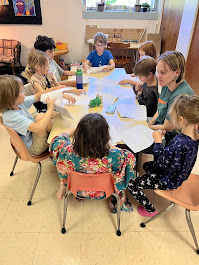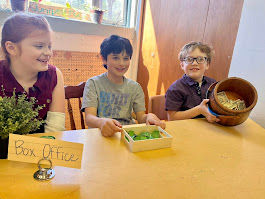Education is a Dance
- Julie Gill

- Aug 2, 2025
- 4 min read
Updated: Aug 3, 2025
“Should education be a standardized process of all children learning the same things, or should it be about the child learning how to manage their learning, with this process being more important than any specific content?”
For the past 5.5 years, we have been defining and refining our approach to education at Juniper Root. We’ve found that education is a delicate dance, an ongoing give-and-take as we work to strike a balance between extremes. We’ve learned to first draw our lines in pencil because eventually, we can erase them completely.
I have been so inspired by this huge movement to support very young children in child-directed education. More and more parents and caregivers are realizing just how much young children learn if they are free to play as much as they please in an appropriately stimulating environment with the support of loving caretakers.
We are aware that pushing academics can have the opposite of the intended effect: https://petergray.substack.com/p/40-long-term-harm-of-early-academic
However, we have observed that when children are free to explore in our space, many are drawn to academics at an early age. Since these children have been free to play, they develop the necessary foundation for academics and then choose to explore them on their own timetable.

We support these budding interests in a variety of ways based on the unique learning styles of our current population. When children feel called, they are welcome to engage with step-by-step practical life activities like juicing oranges or arranging flowers. They can explore Montessori materials like sandpaper letters, nomenclature books, the multiplication board and the moveable alphabet. We have found that when children are ready, they are drawn to these materials and ask adults or older peers for support as needed. Children come to these sorts of activities at all different ages and seasons of their life.

We have also found that Montessori materials don’t resonate with everyone. Some children joyfully develop their sense of order, concentration, coordination, and independence by building restaurants on the playground, planning out the menu, creating mud pies, and serving guests. We have watched children advance their mathematical mind and fine motor skills by constructing complex Lego creations with immaculate symmetry or original artworks with impeccable patterns made from Perler beads. Some children turn up their noses at the movable alphabet and instead teach themselves to read by listening to the same Vox Book ( https://voxshop.libraryideas.com ) over and over, following along with the text as they go.
We recognize, respect, and support children's internal drive to direct themselves towards activities that will aid their development in the manner most suited to their unique learning style. By honoring their process, children learn to trust their instincts and follow their unique path.
Our culture is more and more accepting of a child-directed approach to learning for preschool-aged children. Which is why at Juniper Root, we offer the option for children to attend for the pre-school ages of roughly 3-6 years old. There are no hard cut-offs; children are free to transfer to different learning environments whenever it best suits their needs and the needs of their family.

As children reach school age, we continue to support their development of self-direction at Juniper Root. In her book “Changing Our Minds,” Naomi Fisher articulates a concept that I have had a hard time putting into words:
“Whether or not you think that individual differences in learning is a problem depends on how you see education. Should it be a standardized process of all children learning the same things, or should it be about the child learning how to manage their own learning, with this process being more important than any specific content?”
At Juniper Root, we believe that the skill of managing one’s own learning is the foundation for everything else. It is what guides children towards the content, materials, and support that will best meet their needs at every stage of life. This is a very complex and nuanced skill that requires time, space, and trust to develop.
Children begin forming the foundation for this learning from the moment they begin at Juniper Root, whatever age that may be. The more time they spend here, the more they develop mastery in self-direction, setting them up for success and fulfillment for their days at Juniper Root and beyond. As I discussed over here: https://www.facebook.com/share/p/16JnWhNUHb/ , children’s learning naturally evolves from discovery learning to self-directed mastery learning when we provide time, space, and support for this process to unfold. Children arrive at this stage at all different ages for all different subject areas.

As they get older, education continues to be a conversation between children, adults, and the environment. Learning is always relevant to their current experience because they are the ones driving the process. We arrange the environment based on the skills that our population seeks to acquire for their self-chosen pursuits as they grow and develop. An adult facilitator meets with our older group regularly to discuss areas they’d like to explore and create projects based on those interests: from planning a play to sewing to constructing and exploding a volcano to researching the solar system to building kinetic cardboard sculptures. Children are the driving force behind all of these efforts so they understand the work that is involved to carry out the whole process.

We bring in experts from different fields to share their skills and knowledge with the group. Children then have a chance to connect with folks who are making a living by following their passion.
We collectively follow meaningful pursuits like putting on art show fundraisers and hosting booths at farmers ’ markets. These events allow children to participate in the process of sharing their work with the larger community. These activities are fueled by intrinsic purpose and link children to all of the skills they’ll need to live a fulfilling life in our culture.

Most importantly, we continue to regularly hold long blocks of unstructured time in both indoor and outdoor environments so that children can continue to get to know themselves in a community context and develop structures that support their unique learning path every step of the way.



Comments